拉丁语常用词汇
- 格式:docx
- 大小:18.04 KB
- 文档页数:2
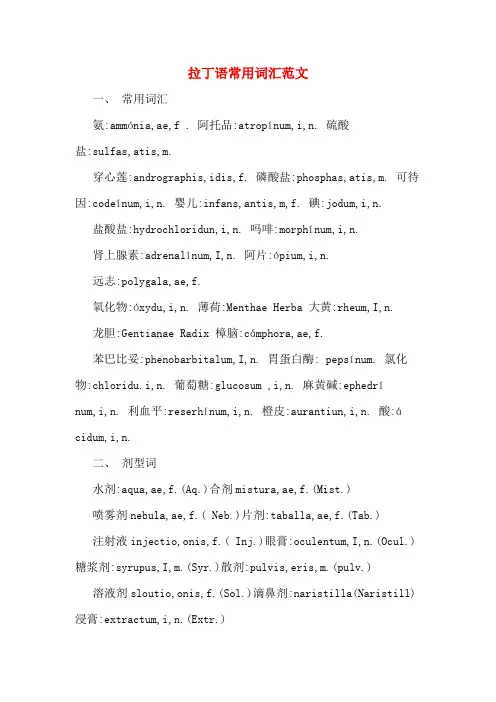
拉丁语常用词汇范文一、常用词汇氨:ammónia,ae,f . 阿托品:atropínum,i,n. 硫酸盐:sulfas,atis,m.穿心莲:andrographis,idis,f. 磷酸盐:phosphas,atis,m. 可待因:codeínum,i,n. 婴儿:infans,antis,m,f. 碘:jodum,i,n.盐酸盐:hydrochloridun,i,n. 吗啡:morphínum,i,n.肾上腺素:adrenalínum,I,n. 阿片:ópium,i,n.远志:polygala,ae,f.氧化物:óxydu,i,n. 薄荷:Menthae Herba 大黄:rheum,I,n.龙胆:Gentianae Radix 樟脑:cámphora,ae,f.苯巴比妥:phenobarbitalum,I,n. 胃蛋白酶: pepsínum. 氯化物:chloridu.i,n. 葡萄糖:glucosum ,i,n. 麻黄碱:ephedrínum,i,n. 利血平:reserhínum,i,n. 橙皮:aurantiun,i,n. 酸:ácidum,i,n.二、剂型词水剂:aqua,ae,f.(Aq.)合剂mistura,ae,f.(Mist.)喷雾剂nebula,ae,f.( Neb.)片剂:taballa,ae,f.(Tab.)注射液injectio,onis,f.( Inj.)眼膏:oculentum,I,n.(Ocul.) 糖浆剂:syrupus,I,m.(Syr.)散剂:pulvis,eris,m.(pulv.) 溶液剂sloutio,onis,f.(Sol.)滴鼻剂:naristilla(Naristill) 浸膏:extractum,i,n.(Extr.)三、形容词复方的:positus,a,um.无菌的:sterilisatus,a,um. 硫酸的:sulfuricus,a,um.浓的:fortis,e.稀释的:dilutes,a,um.蒸馏的destillatus,a,um. 钠的:natricus,a,um.流动的:fluidus,a,um.芳香的:aromaticus,a,um,adj.盐酸的:hydrochloricus,a,um.四、中药材名苦杏仁:Armeniacae Semen Amarum 何首乌:Polygoni Multiflori Radix 枳实:Aurantii Fructus Immaturus 金银花:Lonicerae Japonicae Flos 天麻:Gastrodiae Rhizoma五味子:Schisandrae Chinensis Fructus五、缩写词一天两次:b.i.d.适量:q.s.蒸馏水:aq.dest.一次量顿服:pr.dos.给予同等剂量:D.t.d.No. 用法(标记):S. 一天三次:t.i.d.加至:ad. 给予:M.D.S.口服:p.o. 必要时:p.r.n.肌注:i.m.混合M.D.S.取:Rp. 制成:f.饭后:p.c.Some mon Greek and Latin roots:Root (source)Meaningaster, astr (G)starbene (L)bio (G)dic, dict (L)fer (L)fix (L)geo (G)graph (G)jur, just (L) to hear good, well life to speak to carry to fasten earth to write law English wordsastronomy, astrology audible, auditorium benefit, benevolent biology, autobiography dictionary, dictator transfer, referral fix, suffix, affix geography, geology graphic, photography jury, justicelog, logue (G) word, thought, monolog(ue), astrology,speech biology, neologismluc (L)manu (L)meter, metr(G)op, oper (L)path (G)phil (G)phys (G)scrib, script(L)tele (G)ter, terr (L)vac (L)verb (L)vid, vis (L) light hand measure work feeling child love body, nature to write far off earth empty word to see lucid, translucent manual, manuscript metric, thermometer operation, operator pathetic, sympathy, empathy pediatrics, pedophile philosophy, anglophile physical, physics scribble, manuscript telephone,television territory, extraterrestrial vacant, vacuum, evacuate verbal, verbose video, vision, television Learning Prefixes and SuffixesKnowing the Greek and Latin roots of several prefixes and suffixes (beginning and endings attached to words) can also help us determine the meaning of words. Ante, for instance, means before, and if we connect bellum with belligerant tofigure out the connection with war, we'll know that antebellum refers to the period before war. (In Prefixes showing quantity Meaninghalfone two hundred thousand Prefixes in English Words Prefixes showing negation without, no, not not, absence of, opposing, against opposite to, plement todo theopposite of, remove, reduce do the opposite of, deprive of wrongly, bad Prefixes showing time before afteragain Prefixes showing direction or positionabove, over across, over below, under in front of behind out of into around with Suffixes, on the other hand, modify the meaning of a word and frequentlydetermine its function within a sentence. Take the noun nation, for example. With suffixes, the word bees the adjective national, the adverb nationally, and the verb nationalize. See what words you can e up with that use the following suffixes.Typical noun suffixes are -ence, -ance, -or, -er, -ment, -list, -ism, -ship,-ency, -sion, -tion, -ness, -hood, -dom? Typical verb suffixes are -en, -ify, -ize, -ate? Typical adjective suffixes are -able, -ible, -al, -tial, -tic, -ly, -ful, -ous, -tive, -less, -ish, -ulent ?? The adverb suffix is -ly (although not all words that end in -ly areadverbs—like friendly)拉丁语单词(xx)1.常用单词 1amina,ae,f.叶片albus,a,um,adj. 白色的 altus,a,um,adj.高大的,高的 aromaǐcus,a,um 芳香的 bractea,ae,f. 苞片 bracteola,ae,f.小苞片bulbus,i,m. 鳞茎 calyx,ycis,n. 花萼 capsula,ae,f. 蒴果caulis,is,m. 茎?藤chartaceus,a,um,adj.纸质的 positus,a,um,adj.复方的cornu,us,n 角cortex,ticis,m. 树皮,皮 discus,i,m. 花盘 flos,oris,m. 花 foliǒlum,i,m. 小叶,幼叶 folium,i,m.叶fructus,us,m. 果实glaber,bra,brum,adj.无毛的 herba,ae,f. 全草 lignum,ī,n. 心材longus,a,um,adj. 长的 niger,a,um,adj. 黑的 1obovatus,a,um,adj:倒卵形的 ovatus,a,um,adj.卵形的petiolus,i,m.叶柄 pollen,inis,n. 花粉 radix,icis,f.根ramǔlus,ī,m. 茎枝,嫩枝 rhizōma,atis,n. 根茎ruber,bra,brum, adj. 红色的 semen,inis,n. 种子species,ei,f. 种 stipula,ae,f.托叶viridis,is,e,adj.绿色的3. 处方中常用的拉丁语及缩写词2内容仅供参考。
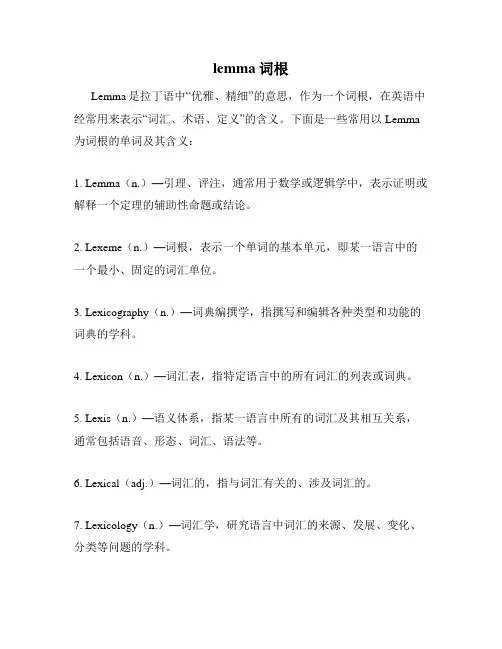
lemma词根
Lemma是拉丁语中“优雅、精细”的意思,作为一个词根,在英语中经常用来表示“词汇、术语、定义”的含义。
下面是一些常用以Lemma 为词根的单词及其含义:
1. Lemma(n.)—引理、评注,通常用于数学或逻辑学中,表示证明或解释一个定理的辅助性命题或结论。
2. Lexeme(n.)—词根,表示一个单词的基本单元,即某一语言中的一个最小、固定的词汇单位。
3. Lexicography(n.)—词典编撰学,指撰写和编辑各种类型和功能的词典的学科。
4. Lexicon(n.)—词汇表,指特定语言中的所有词汇的列表或词典。
5. Lexis(n.)—语义体系,指某一语言中所有的词汇及其相互关系,通常包括语音、形态、词汇、语法等。
6. Lexical(adj.)—词汇的,指与词汇有关的、涉及词汇的。
7. Lexicology(n.)—词汇学,研究语言中词汇的来源、发展、变化、分类等问题的学科。
8. Dilemma(n.)—两难境地,指不可避免的两个选择中的抉择,无论
作出哪个决定都会带来负面影响。
9. Epilemma(n.)—诡辩,指无法解决的问题、争议或逻辑矛盾,从
而产生的歧义和困惑。
10. Axiom(n.)—公理,指一个自成立的、不需要证明的前提或事实,被视为其他推理的基础。
通过以上单词及其含义,我们可以看出以Lemma为词根的单词,大多
数与语言、词汇、逻辑推理等方面有关。
作为一个文笔优美的中文写
作专家,理解Lemma这个词根的含义并灵活运用其中的单词,可以为
自己的写作增添更多的文采和精度。
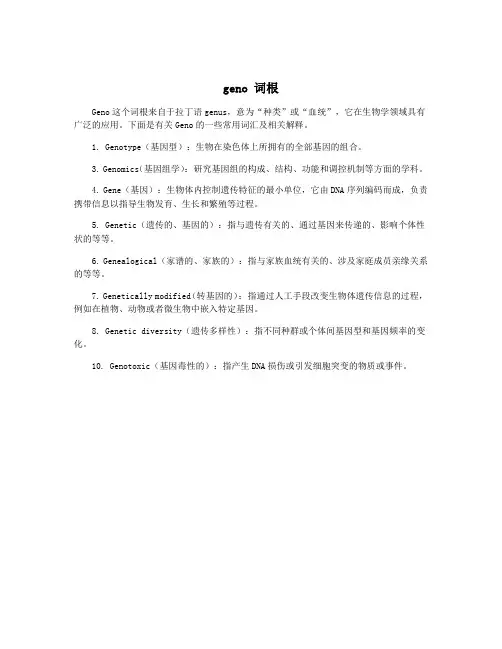
geno 词根
Geno这个词根来自于拉丁语genus,意为“种类”或“血统”,它在生物学领域具有广泛的应用。
下面是有关Geno的一些常用词汇及相关解释。
1. Genotype(基因型):生物在染色体上所拥有的全部基因的组合。
3. Genomics(基因组学):研究基因组的构成、结构、功能和调控机制等方面的学科。
4. Gene(基因):生物体内控制遗传特征的最小单位,它由DNA序列编码而成,负责携带信息以指导生物发育、生长和繁殖等过程。
5. Genetic(遗传的、基因的):指与遗传有关的、通过基因来传递的、影响个体性状的等等。
6. Genealogical(家谱的、家族的):指与家族血统有关的、涉及家庭成员亲缘关系的等等。
7. Genetically modified(转基因的):指通过人工手段改变生物体遗传信息的过程,例如在植物、动物或者微生物中嵌入特定基因。
8. Genetic diversity(遗传多样性):指不同种群或个体间基因型和基因频率的变化。
10. Genotoxic(基因毒性的):指产生DNA损伤或引发细胞突变的物质或事件。
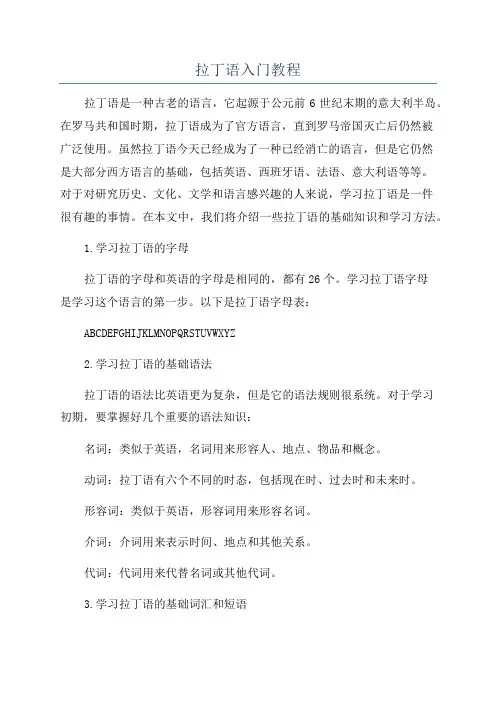
拉丁语入门教程拉丁语是一种古老的语言,它起源于公元前6世纪末期的意大利半岛。
在罗马共和国时期,拉丁语成为了官方语言,直到罗马帝国灭亡后仍然被广泛使用。
虽然拉丁语今天已经成为了一种已经消亡的语言,但是它仍然是大部分西方语言的基础,包括英语、西班牙语、法语、意大利语等等。
对于对研究历史、文化、文学和语言感兴趣的人来说,学习拉丁语是一件很有趣的事情。
在本文中,我们将介绍一些拉丁语的基础知识和学习方法。
1.学习拉丁语的字母拉丁语的字母和英语的字母是相同的,都有26个。
学习拉丁语字母是学习这个语言的第一步。
以下是拉丁语字母表:ABCDEFGHIJKLMNOPQRSTUVWXYZ2.学习拉丁语的基础语法拉丁语的语法比英语更为复杂,但是它的语法规则很系统。
对于学习初期,要掌握好几个重要的语法知识:名词:类似于英语,名词用来形容人、地点、物品和概念。
动词:拉丁语有六个不同的时态,包括现在时、过去时和未来时。
形容词:类似于英语,形容词用来形容名词。
介词:介词用来表示时间、地点和其他关系。
代词:代词用来代替名词或其他代词。
3.学习拉丁语的基础词汇和短语学习拉丁语最基础的部分是掌握一定数量的词汇。
熟悉常用的拉丁语短语也是非常有帮助的,因为它们可以帮助您理解这个语言的基本思维方式。
以下是一些常用的拉丁短语:Carpe diem:抓住今天Veni, vidi, vici:我来了,我看到了,我战胜了Alea iacta est:掷了骰子Memento mori:记住你必须死4.加入学习拉丁语的团体对于初学者来说,找到一个学习拉丁语的团体或者社交群组是非常有帮助的。
这些团体可以提供给您有关拉丁语的信息、资源和建议,他们可能会通过互联网或者当地的学习机构进行线上或线下的集会,因此您可以在互相交流中提高您的拉丁语水平。
总之,学习拉丁语需要投入大量时间和精力,但是它也可以带给我们意想不到的乐趣和收获。
掌握这个语言可以让您更加深入地了解欧洲历史和文化,甚至可以帮助您更好地理解您使用的其他语言。
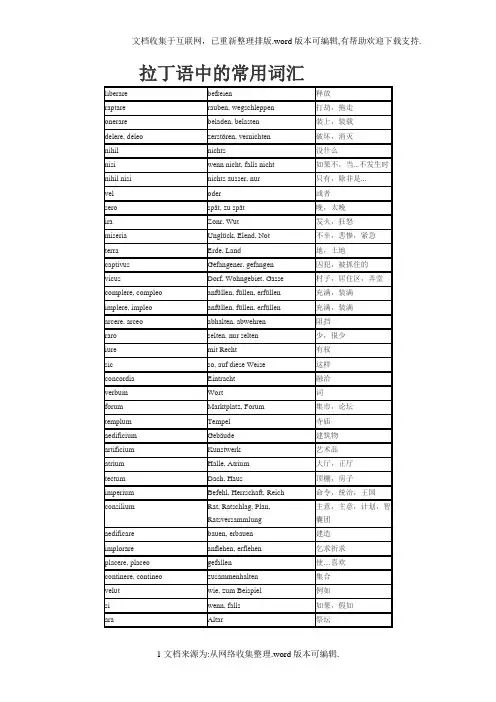
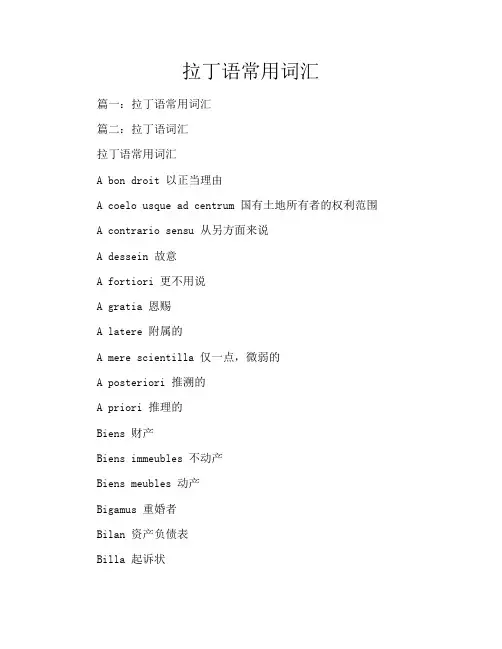
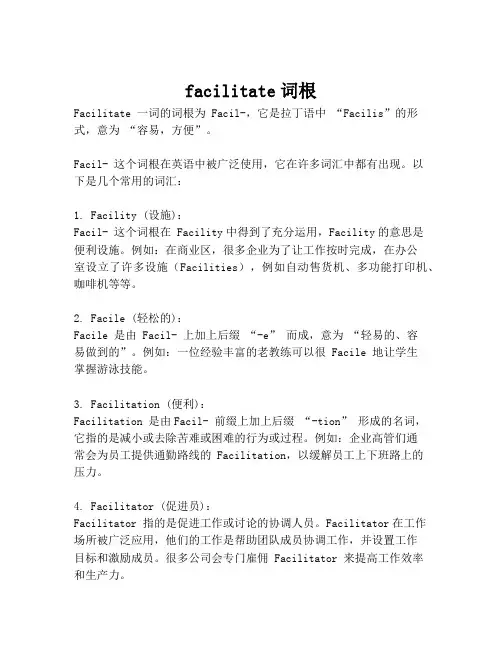
facilitate词根Facilitate 一词的词根为 Facil-,它是拉丁语中“Facilis”的形式,意为“容易,方便”。
Facil- 这个词根在英语中被广泛使用,它在许多词汇中都有出现。
以下是几个常用的词汇:1. Facility (设施):Facil- 这个词根在 Facility中得到了充分运用,Facility的意思是便利设施。
例如:在商业区,很多企业为了让工作按时完成,在办公室设立了许多设施(Facilities),例如自动售货机、多功能打印机、咖啡机等等。
2. Facile (轻松的):Facile 是由 Facil- 上加上后缀“-e” 而成,意为“轻易的、容易做到的”。
例如:一位经验丰富的老教练可以很 Facile 地让学生掌握游泳技能。
3. Facilitation (便利):Facilitation 是由Facil- 前缀上加上后缀“-tion” 形成的名词,它指的是减小或去除苦难或困难的行为或过程。
例如:企业高管们通常会为员工提供通勤路线的 Facilitation,以缓解员工上下班路上的压力。
4. Facilitator (促进员):Facilitator 指的是促进工作或讨论的协调人员。
Facilitator在工作场所被广泛应用,他们的工作是帮助团队成员协调工作,并设置工作目标和激励成员。
很多公司会专门雇佣 Facilitator 来提高工作效率和生产力。
总结来说,Facil- 这个词根在许多词汇中都有出现,它的本意是“方便、容易”。
Facilitate 一词指的是在某些事情中去除困难或帮助人们更容易地完成任务。
这个词根被广泛应用于商业,教育和其他企业中,并且它的用途也在不断扩大。
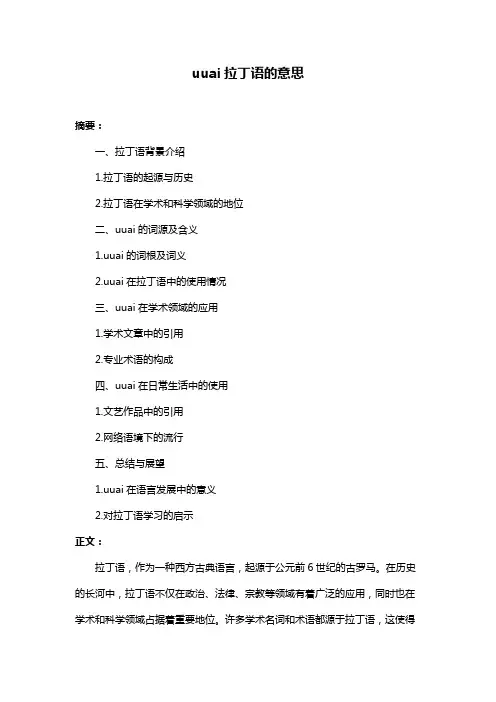
uuai拉丁语的意思摘要:一、拉丁语背景介绍1.拉丁语的起源与历史2.拉丁语在学术和科学领域的地位二、uuai的词源及含义1.uuai的词根及词义2.uuai在拉丁语中的使用情况三、uuai在学术领域的应用1.学术文章中的引用2.专业术语的构成四、uuai在日常生活中的使用1.文艺作品中的引用2.网络语境下的流行五、总结与展望1.uuai在语言发展中的意义2.对拉丁语学习的启示正文:拉丁语,作为一种西方古典语言,起源于公元前6世纪的古罗马。
在历史的长河中,拉丁语不仅在政治、法律、宗教等领域有着广泛的应用,同时也在学术和科学领域占据着重要地位。
许多学术名词和术语都源于拉丁语,这使得拉丁语成为了学术研究和科学交流的重要工具。
在拉丁语中,有一个词汇引起了我们的注意,那就是“uuai”。
uuai这个词源于拉丁语的词根“uai”,意为“悲伤”或“哀痛”。
在拉丁语中,这个词常用于表达悲伤、遗憾的情感。
而在现代社会,uuai以一种全新的姿态回归到人们的视线中。
在学术领域,uuai常常出现在学术论文和专业书籍中。
由于拉丁语在学术领域的独特地位,许多学者在撰写论文时会使用拉丁语词汇,以增加论文的学术性和权威性。
uuai作为一种具有丰富情感色彩的词汇,在学术文章中的应用也使得文章的表达更为生动和形象。
除了学术领域,uuai在现实生活中也逐渐流行起来。
许多文艺作品,如电影、电视剧、小说等,会引用拉丁语台词或标题,以增加作品的文化内涵。
而网络的普及,更是让拉丁语走进了人们的日常生活。
在网络语境下,uuai成为了表达悲伤、遗憾情感的一种方式,被广泛应用于社交媒体、聊天工具等场景。
总之,uuai这个词在拉丁语中的演变,反映了语言的发展和变化。
从最初的悲伤、哀痛,到现在的流行词汇,uuai的演变历程为我们提供了理解语言发展的新视角。
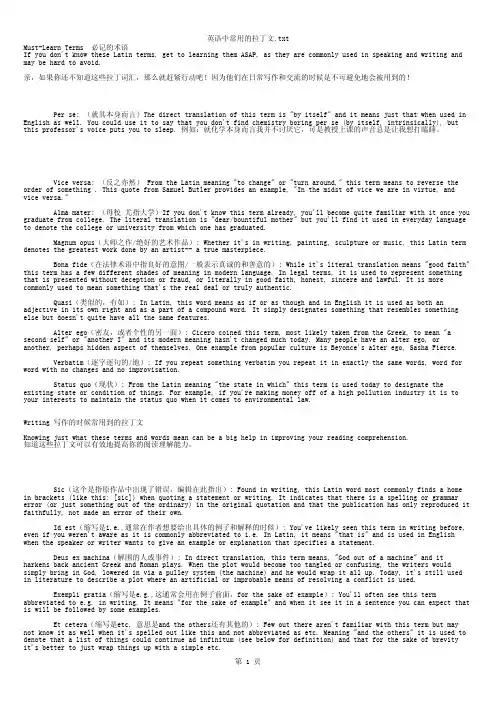
Must-Learn Terms 必记的术语If you don't know these Latin terms, get to learning them ASAP, as they are commonly used in speaking and writing and may be hard to avoid.亲,如果你还不知道这些拉丁词汇,那么就赶紧行动吧!因为他们在日常写作和交流的时候是不可避免地会被用到的!Per se: (就其本身而言)The direct translation of this term is "by itself" and it means just that when used in English as well. You could use it to say that you don't find chemistry boring per se (by itself, intrinsically), but this professor's voice puts you to sleep. 例如:就化学本身而言我并不讨厌它,可是教授上课的声音总是让我想打瞌睡。
Vice versa: (反之亦然) From the Latin meaning "to change" or "turn around," this term means to reverse the order of something . This quote from Samuel Butler provides an example, "In the midst of vice we are in virtue, and vice versa."Alma mater: (母校 尤指大学)If you don't know this term already, you'll become quite familiar with it once you graduate from college. The literal translation is "dear/bountiful mother" but you'll find it used in everyday language to denote the college or university from which one has graduated.Magnum opus(大师之作/绝好的艺术作品): Whether it's in writing, painting, sculpture or music, this Latin term denotes the greatest work done by an artist-- a true masterpiece.Bona fide(在法律术语中指良好的意图/一般表示真诚的和善意的): While it's literal translation means "good faith" this term has a few different shades of meaning in modern language. In legal terms, it is used to represent something that is presented without deception or fraud, or literally in good faith, honest, sincere and lawful. It is more commonly used to mean something that's the real deal or truly authentic.Quasi(类似的,有如): In Latin, this word means as if or as though and in English it is used as both an adjective in its own right and as a part of a compound word. It simply designates something that resembles something else but doesn't quite have all the same features.Alter ego(密友,或者个性的另一面): Cicero coined this term, most likely taken from the Greek, to mean "a second self" or "another I" and its modern meaning hasn't changed much today. Many people have an alter ego, or another, perhaps hidden aspect of themselves. One example from popular culture is Beyonce's alter ego, Sasha Fierce.Verbatim(逐字逐句的/地): If you repeat something verbatim you repeat it in exactly the same words, word for word with no changes and no improvisation.Status quo(现状): From the Latin meaning "the state in which" this term is used today to designate the existing state or condition of things. For example, if you're making money off of a high pollution industry it is to your interests to maintain the status quo when it comes to environmental law.Writing 写作的时候常用到的拉丁文Knowing just what these terms and words mean can be a big help in improving your reading comprehension.知道这些拉丁文可以有效地提高你的阅读理解能力。
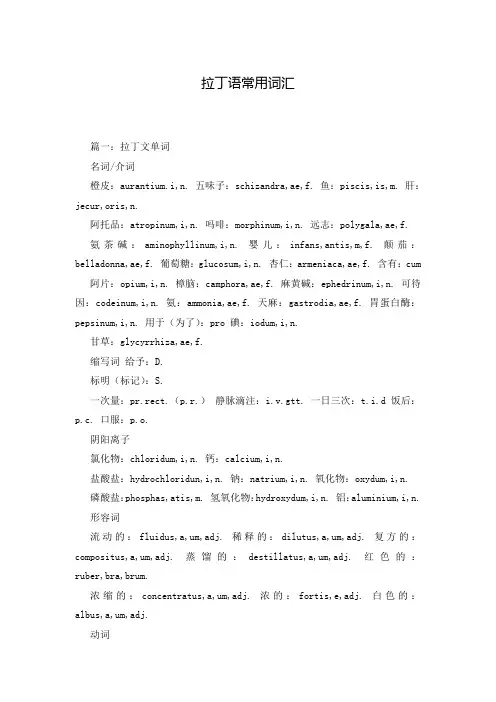
拉丁语常用词汇篇一:拉丁文单词名词/介词橙皮:aurantium.i,n. 五味子:schizandra,ae,f. 鱼:piscis,is,m. 肝:jecur,oris,n.阿托品:atropinum,i,n. 吗啡:morphinum,i,n. 远志:polygala,ae,f.氨茶碱:aminophyllinum,i,n. 婴儿:infans,antis,m,f. 颠茄:belladonna,ae,f. 葡萄糖:glucosum,i,n. 杏仁:armeniaca,ae,f. 含有:cum 阿片:opium,i,n. 樟脑:camphora,ae,f. 麻黄碱:ephedrinum,i,n. 可待因:codeinum,i,n. 氨:ammonia,ae,f. 天麻:gastrodia,ae,f. 胃蛋白酶:pepsinum,i,n. 用于(为了):pro 碘:iodum,i,n.甘草:glycyrrhiza,ae,f.缩写词给予:D.标明(标记):S.一次量:pr.rect.(p.r.)静脉滴注:i.v.gtt. 一日三次:t.i.d 饭后:p.c. 口服:p.o.阴阳离子氯化物:chloridum,i,n. 钙:calcium,i,n.盐酸盐:hydrochloridun,i,n. 钠:natrium,i,n. 氧化物:oxydum,i,n.磷酸盐:phosphas,atis,m. 氢氧化物:hydroxydum,i,n. 铝:aluminium,i,n.形容词流动的:fluidus,a,um,adj. 稀释的:dilutus,a,um,adj. 复方的:compositus,a,um,adj. 蒸馏的:destillatus,a,um,adj. 红色的:ruber,bra,brum.浓缩的:concentratus,a,um,adj. 浓的:fortis,e,adj. 白色的:albus,a,um,adj.动词制成:formo,are,v. 请取:recipio,ere,v,a. 加:addo,ere,v.中药材赤芍:Paeoniae Radix Rubra苦杏仁:Armeniacae Semen Amarum 女贞子: Ligustri Lucidi Fructus 大黄:Rhei Radix et Rhizoma 百合:Lilii Bulbus白芍:Paeoniae Radix Alba 天麻:Gastrodiae Rhizoma 三七:Notoginseng Radix剂型词糖浆:syrupus,i,m. 丸剂:pilula,ae,f. 浸膏:extractum,i,n. 水剂:aqua,ae,f. 片剂:tabella,ae,f. 酊剂:tinctura,ae,f. 油剂:oleum,i,n.注射剂:injectio,onis,f. 糖浆剂:syrupus,i,m. 散剂:pulvis,eris,m. 喷雾剂:nebula,ae,f. 合剂:mistura,ae,f.篇二:拉丁语单词拉丁语单词(2021)1.常用单词 1amina,ae,f.叶片albus,a,um,adj. 白色的 altus,a,um,adj.高大的,高的aromaǐcus,a,um 芳香的bractea,ae,f. 苞片bracteola,ae,f.小苞片bulbus,i,m. 鳞茎calyx,ycis,n. 花萼 capsula,ae,f. 蒴果 caulis,is,m. 茎?藤chartaceus,a,um,adj.纸质的 compositus,a,um,adj.复方的cornu,us,n 角cortex,ticis,m. 树皮,皮 discus,i,m. 花盘 flos,oris,m. 花foliǒlum,i,m. 小叶,幼叶 folium,i,m.叶fructus,us,m. 果实glaber,bra,brum,adj.无毛的 herba,ae,f. 全草lignum,ī,n. 心材longus,a,um,adj. 长的 niger,a,um,adj. 黑的 1obovatus,a,um,adj:倒卵形的 ovatus,a,um,adj.卵形的 petiolus,i,m.叶柄 pollen,inis,n. 花粉 radix,icis,f.根ramǔlus,ī,m. 茎枝,嫩枝rhizōma,atis,n. 根茎ruber,bra,brum, adj. 红色的semen,inis,n. 种子species,ei,f. 种stipula,ae,f.托叶viridis,is,e,adj.绿色的3. 处方中常用的拉丁语及缩写词2篇三:125个常用拉丁语词根125个常用拉丁语词根a-, ab-, abs- (Latin: from, away, away from; used as a prefix).This prefix is normally used with elements of Latin and French origins (abs- usually joins elements beginning with c, q or t).The form ab- is regularly used before all vowels and h; and it becomesa- before the consonants m, p, and v. The prefix apo- has similar meanings. ad- (Latin: to, a direction toward, addition to, near; used as a prefix). ad- appears before vowels and before the consonants d, h, j, m, and v: agri-, agrio- (Greek Latin: fields).“Wild, savage; living in the fields” through Latin, ager, agri. amat-, amor-, am- (Latin: love, loving; fondness for).ami-, amic- (Latin: friend).ambi-, amb- (Latin: both, on both sides; around, about).ambul-, ambulat-, -ambulate, -ambulating, -ambulation -ambulator, -ambulatory, -ambulant, -ambulic, -ambulism, -ambulist (Latin: walk, take steps,move around; from “to wander, to go astray”).anima-, anim- (Latin: animal life; breath; soul; mind).Anima- is “a living being”from a Latin form meaning, “of air, having a spirit, living”, which in turn comes from another form meaning, “breath of air, air, soul, life”.anni-, annu-, enni- (Latin: year, yearly).ante-, anti-, ant- (Latin: before, in front of, prior to, forward; used as a prefix).Compare this element with anti-, meaning “against”. Anti-, with the meaning of “before”, is found in very few words, such as: “antipasto” (from Italian). and “anticipate” with its various forms, plus a few scientific terms.aqua-, aquatic-, aqui-, aqu-, -aquatically, aque-, -aqueous (Latin: water). audio-, aud-, audi-, audit- (Latin: hearing, listening, perception of sounds).bene-, ben-, beni- (Latin: good, well) and bon- (Latin: good). brevi-, brev- [brie-, bri-] (Latin: short).cand-, can-, cend- (Latin: glow; white).capit-, capt-, ceps-, chapt-, chef, cip-, -cup- (Latin: head, leader, chief, or first).carno-, carn-, carne-, carni- (Latin: flesh, meat).celer- (Latin: fast, speed, swift, rapid).centi-, cent- (Latin: hundred; a decimal prefix used in the international metric system for measurements).This prefix is used in the metric [decimal] system as, one-hundredth [U.S.] and hundredth [U.K.], and denotes 1/100th of a unit or 10-2 [0.01]. The metric symbol for centi- is c.-cise, -cis, -cide (Latin: a suffix; to cut, cut).-cide, -cides, -cidal (Latin: a suffix; kill, killer; murder, to cause death, slayer; cutter; “to cut down”).Don’t confuse this element with the another -cide that means “to cut”; although -cide, “death”, is related to -cise, -cide, “to cut down”. circum- (Latin: around, about, surrounding, on all sides; literally, “in a circle”).com- [co-, cog-, col-, con-, cor-] (Latin: together, with; used as aprefix). contra-, contro-, counter, contre- (Latin: against, opposed to, opposite, contrary; used as a prefix).cor-, cord-, cour- (Latin: heart).corp-, corpor-, corpus- (Latin: body).cred-, credit-, creed- (Latin: believe, belief, faith, confidence, trust). cura-, cur- (Latin: heal, cure [care for, give attention to, to take care of]). cur(r).-, curs-, -course (Latin: run, go).dei-, div- (Latin: God, god [deity, divine nature]).adieu (French): Goodbye (literally, “I commend you to god.”). dento-, dent-, denta-, dentino-, denti-, dentin- (Latin: tooth, teeth). dic-, dict- (Latin: talk, speak, say, tell, declare).digit (Latin: finger, toe).dor-, do-, don- (Greek Latin: gift).dorm-, dormi- (Latin: sleep, sleeping).duo-, du- (Latin: two; a number used as a prefix).duc-, -duce, -duct, -ducent, -ductor, -duction, -ductive, -ducer, -ducement, ducation (Latin: lead, leading, bring, take, draw).equ-, equi- (Latin: same, equal, similar, even).ex- (e-, ef-). (Latin: [out of, from]; [upward]; [completely, entirely]; [to remove from, deprive of]; [without]; [former]; used as a prefix).extra-, extro- (Latin: beyond, outside, on the outside, outward, external; used as a prefix).fac-, fact-, feas-, -feat, -fect, -feit, -facient, -faction, fic-, -fy, facil- (Latin: make, do, build, cause, produce; forming, shaping).fid-, fidel- (Latin: believe, belief, trust, faith).fin- (Latin: end, last, limit, boundary, border).flagr- (Latin: fire; burn, blaze).fluct-, flucti-, -flux, flu- (Latin: flow, wave).fortu-, fortun- (Latin: chance, fate, luck).frag-, frang-, fract-, fring- (Latin: break).fug-, -fuge, -fugit (Latin: drive away, flee, fly, run away).grad-, -grade, -gred, -gree, -gress (Latin: walk, step, take steps, move around; walking or stepping).grav-, griev- (Latin: heavy, weighty).habili-, habil- (Latin: clothe, clothing; that which may be easily handled, suitable, fit, proper).ign-, igni-, ignis- (Latin: fire, burn).inter- (Latin: between [als among, mutually, together]; used as a prefix). intra- (Latin: within, inside, on the inside; used as a prefix). jet-, -ject, -jecting, -jected, -jection, -jector, -jectory; jac- (Latin: throw, send, fling, hurl, cast; gush; spurt).junct-, jug- (Latin: join, unite, yoke).lav-, lava-, lavat- (Latin: wash, bathe).linguo-, lingu-, lingua-, -linguist, -linguistic, -linguistical, -linguistically (Latin: tongue, language).luco-, luc-, luci-, lux, -lucence, -lucent (Latin: light, shine). locu-, loc- (Latin: talk, speak, say, word, speech).lumen-, lumin-, lum- (Latin: light, shine; source).luna-, luni-, lun-, lunu- (Latin: moon, light, shine).magni-, magn- (Latin: large, big, great).mal-, male-, mali- (Latin: bad, badly, harsh, wrong; ill; evil; abnormal, defective).This combining form has no etymological connection to “male”, meaning “man” or “masculine”; despite what some women may think. manu-, man-, mani- (Latin: hand).medio-, medi- (Latin: middle).migr-, migrat- (Latin: wander, moving).milli- [MIL i], mille-, mill-, mili- (Latin: thousand; a decimal prefix used in the international metric system for measurements).。
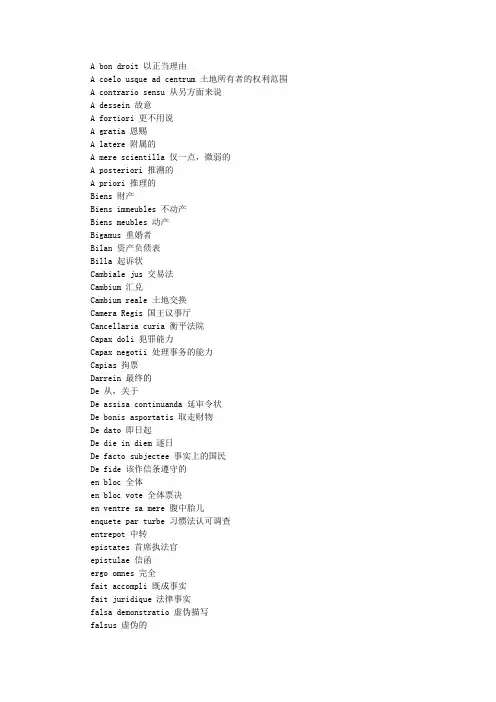
A bon droit 以正当理由A coelo usque ad centrum 土地所有者的权利范围A contrario sensu 从另方面来说A dessein 故意A fortiori 更不用说A gratia 恩赐A latere 附属的A mere scientilla 仅一点,微弱的A posteriori 推溯的A priori 推理的Biens 财产Biens immeubles 不动产Biens meubles 动产Bigamus 重婚者Bilan 资产负债表Billa 起诉状Cambiale jus 交易法Cambium 汇兑Cambium reale 土地交换Camera Regis 国王议事厅Cancellaria curia 衡平法院Capax doli 犯罪能力Capax negotii 处理事务的能力Capias 拘票Darrein 最终的De 从,关于De assisa continuanda 延审令状De bonis asportatis 取走财物De dato 即日起De die in diem 逐日De facto subjectee 事实上的国民De fide 该作信条遵守的en bloc 全体en bloc vote 全体票决en ventre sa mere 腹中胎儿enquete par turbe 习惯法认可调查entrepot 中转epistates 首席执法官epistulae 信函ergo omnes 完全fait accompli 既成事实fait juridique 法律事实falsa demonstratio 虚伪描写falsus 虚伪的familia 家族familiae emptor 遗嘱执行人famosus 诽谤人格famosus libellus 损害名誉的诽谤faute de service 公务过失germanus 纯血亲gratis 无偿地gratis dictum 空言gross modo 大体上haereditas 继承权haereditas ab intestato 无遗嘱继承人haeres 继承人haeres natus 亲生的继承人haeres suus 直系继承人heares legitimus 合法继承人ibidem 出处同上id est 即idem 同上idem genus 同类idem sonans 同音姓名impubes 未成年人in articulo 立即in articulo mortis 临死时in autre droit 凭他人权力in bonis habere 所有权in capita 按人头in re 对于jus abstinendi 抛弃权得jus abutendi 滥用权jus accrescendi 取得权利jus ad bellum 诉诸战争权jus ad rem 物权jus aequum 公正法jus albinatus 没收外侨遗产kashrut 饮食教规ketubba 婚书kiyas 吉雅论kreis 行政区lapsus 错误lapsus calami 笔误lapsus linguae 失言lapsus memoriae 记忆上的错误lata culpa 重大过失levissima culpa 轻微过失Lis 诉讼案件Mala fides 恶意Mala in se 自然犯Mala per se 本质罪恶Mala praxis 医疗失误Mala prohibita 法律所禁止的行为Malo animo 恶念Malum in se 不法Malum prohibitum 法律禁止的不法行为Nemo 无人Nexi 受到Non cepit 无扣留动产答辩Non compos mentis 精神不健全Non constat 不显明Nul 无毁损Nulla bona 无财物Nullius filius 私生子Officina justitiae 法庭On-dit 据说Onerari non debet 否认原告所提债款的存在Onus probandi 举证责任Outré越出常规的Pacta 无形约束Pactio 一般协议Pactum 合约Pactum de contrahendo 缔约承诺Pactum de non petendo 不受债权人请求权约束的协议Pactum de retrovendendo 回购协议Pactum illicitum 非法协定peccadillo 轻罪peccatum 罪行peccavi 认罪peculium 特有产Pro 为了Probatio minus plena 不完全Probatio mortua 物证Quia timet 由于畏惧或疑虑Querens 原告Questiones perpetuae 常设刑事法庭Questionnaire 调查表Qui ne dit mot consent 沉默即为同意Qui nimium probat mihil probat 证明过多等于没有证明Ratione soli 仅有的理由Ratione temperis 属时理由Ratione tenurae 租期理由Rente 定期利息Renvoi 驱逐外国人出境 renvoiRenvoi au permier degree 一级反致Res alienae 属于他人的财产Res allodialis 自由让与的财产Rescyt 窝藏重罪犯人Resgestae 成就Resiance 居住Residuum 剩余物Sanguis 血Sans 没有Sans frais 免费Sans nombre 没有限制Sans phrase 直率之言Sans recours 无追索权secundum 根据solum 土地solutio 清偿债务solutio sine causa 偿还不存在之债solvit ad diem 被告宣称可随时偿还债务testimonium 签名前条款testis 证人testmamenti factio activa 立遗嘱的能力torus 侵权行为tota curia 全法院totidem verbis 明确的totis quoties 经常发生totis viribus 竭尽全力totis caelo 正相反tous les biens 所有财产uberrima fides 坦率诚实uberrima fides contract 坦率诚实合同ubi infra 下面提及之处ubi re vera 真实的地方ubi remedium ibi jus 有法律救济就有权利ubi supra 上面提及之处ubicunque est injuria ,ibi damnum sequitur 有侵权必有损害ultima 最后的ultima ratio 最后的谈判ultimum supplicium 极刑ultimus haeres 最后继承人vadium vivium 以收益抵债务之典权valium 毒品vas 抵押vastum 荒地vectigalia 关税vectura 货运vel non 或者不是venditio 卖 vend\vendee\vender\vendor\vendue viva voce 口头zygocephalum 土地测量。
拉丁语常用词汇范文名词/介词橙皮:aurantium.i,n. 五味子:schizandra,ae,f. 鱼:piscis,is,m. 肝:jecur,oris,n.阿托品:atropinum,i,n. 吗啡:morphinum,i,n. 远志:polygala,ae,f.氨茶碱:aminophyllinum,i,n. 婴儿:infans,antis,m,f. 颠茄:belladonna,ae,f. 葡萄糖:glucosum,i,n. 杏仁:armeniaca,ae,f. 含有:cum阿片:opium,i,n. 樟脑:camphora,ae,f. 麻黄碱:ephedrinum,i,n. 可待因:codeinum,i,n. 氨:ammonia,ae,f. 天麻:gastrodia,ae,f. 胃蛋白酶:pepsinum,i,n. 用于(为了):pro 碘:iodum,i,n.甘草:glycyrrhiza,ae,f.缩写词给予:D.标明(标记):S.一次量:pr.rect.(p.r.)静脉滴注:i.v.gtt. 一日三次:t.i.d 饭后:p.c. 口服:p.o.阴阳离子氯化物:chloridum,i,n. 钙:calcium,i,n.盐酸盐:hydrochloridun,i,n. 钠:natrium,i,n. 氧化物:oxydum,i,n.磷酸盐:phosphas,atis,m. 氢氧化物:hydroxydum,i,n. 铝:aluminium,i,n.形容词流动的:fluidus,a,um,adj. 稀释的:dilutus,a,um,adj. 复方的:positus,a,um,adj. 蒸馏的:destillatus,a,um,adj. 红色的:ruber,bra,brum.浓缩的:concentratus,a,um,adj. 浓的:fortis,e,adj. 白色的:albus,a,um,adj.动词制成:formo,are,v. 请取:recipio,ere,v,a. 加:addo,ere,v.中药材赤芍:Paeoniae Radix Rubra苦杏仁:Armeniacae Semen Amarum 女贞子: Ligustri Lucidi Fructus 大黄:Rhei Radix et Rhizoma 百合:Lilii Bulbus 白芍:Paeoniae Radix Alba 天麻:Gastrodiae Rhizoma 三七:Notoginseng Radix剂型词糖浆:syrupus,i,m. 丸剂:pilula,ae,f. 浸膏:extractum,i,n. 水剂:aqua,ae,f. 片剂:tabella,ae,f. 酊剂:tinctura,ae,f. 油剂:oleum,i,n.注射剂:injectio,onis,f. 糖浆剂:syrupus,i,m. 散剂:pulvis,eris,m. 喷雾剂:nebula,ae,f. 合剂:mistura,ae,f.拉丁语单词(xx)1.常用单词 1amina,ae,f.叶片albus,a,um,adj. 白色的 altus,a,um,adj.高大的,高的 aromaǐcus,a,um 芳香的 bractea,ae,f. 苞片 bracteola,ae,f.小苞片bulbus,i,m. 鳞茎 calyx,ycis,n. 花萼 capsula,ae,f. 蒴果caulis,is,m. 茎?藤chartaceus,a,um,adj.纸质的 positus,a,um,adj.复方的cornu,us,n 角cortex,ticis,m. 树皮,皮 discus,i,m. 花盘 flos,oris,m. 花 foliǒlum,i,m. 小叶,幼叶 folium,i,m.叶fructus,us,m. 果实glaber,bra,brum,adj.无毛的 herba,ae,f. 全草 lignum,ī,n. 心材longus,a,um,adj. 长的 niger,a,um,adj. 黑的 1obovatus,a,um,adj:倒卵形的 ovatus,a,um,adj.卵形的petiolus,i,m.叶柄 pollen,inis,n. 花粉 radix,icis,f.根ramǔlus,ī,m. 茎枝,嫩枝 rhizōma,atis,n. 根茎ruber,bra,brum, adj. 红色的 semen,inis,n. 种子species,ei,f. 种 stipula,ae,f.托叶viridis,is,e,adj.绿色的3. 处方中常用的拉丁语及缩写词2125个常用拉丁语词根a-, ab-, abs- (Latin: from, away, away from; used as a prefix).This prefix is normally used with elements of Latin and French origins (abs- usually joins elements beginning with c, q or t).The form ab- is regularly used before all vowels and h; and it bees a- before the consonants m, p, and v. The prefix apo- has similar meanings.ad- (Latin: to, a direction toward, addition to, near; used as a prefix). ad- appears before vowels and before the consonants d, h, j, m, and v: agri-, agrio- (Greek > Latin: fields).“Wild, savage; living in the fields” through Latin, ager, agri. amat-, amor-, am- (Latin: love, loving; fondness for). ami-, amic- (Latin: friend).ambi-, amb- (Latin: both, on both sides; around, about). ambul-, ambulat-, -ambulate, -ambulating, -ambulation-ambulator, -ambulatory, -ambulant, -ambulic, -ambulism,-ambulist (Latin: walk, take steps,move around; from “to wander, to go astray”).anima-, anim- (Latin: animal life; breath; soul; mind).Anima- is “a living being” from a Latin form meaning, “of air, having a spirit, living”, which in turn es from another form meaning, “breath of air, air, soul, life”.anni-, annu-, enni- (Latin: year, yearly).ante-, anti-, ant- (Latin: before, in front of, prior to, forward; used as a prefix).Compare this element with anti-, meaning “against”. Anti-, with the meaning of “before”, is found in very few words, such as: “antipasto” (from Italian). and “anticipate” with its various forms, plus a few scientific terms.aqua-, aquatic-, aqui-, aqu-, -aquatically, aque-, -aqueous (Latin: water). audio-, aud-, audi-, audit- (Latin: hearing, listening, perception of sounds).bene-, ben-, beni- (Latin: good, well) and bon- (Latin: good). brevi-, brev- [brie-, bri-] (Latin: short).cand-, can-, cend- (Latin: glow; white).capit-, capt-, ceps-, chapt-, chef, cip-, -cup- (Latin: head, leader, chief, or first).carno-, carn-, carne-, carni- (Latin: flesh, meat).celer- (Latin: fast, speed, swift, rapid).centi-, cent- (Latin: hundred; a decimal prefix used in the international metric system for measurements).This prefix is used in the metric [decimal] system as, one-hundredth [U.S.] and hundredth [U.K.], and denotes 1/100th of a unit or 10-2 [0.01]. The metric symbol for centi- is c. -cise, -cis, -cide (Latin: a suffix; to cut, cut).-cide, -cides, -cidal (Latin: a suffix; kill, killer; murder, to cause death, slayer; cutter; “to cut down”).Don’t confuse this element with the another -cide that means “to cut”; although -cide, “death”, is related to -cise, -cide, “to cut down”.circum- (Latin: around, about, surrounding, on all sides; literally, “in a circle”).- [co-, cog-, col-, con-, cor-] (Latin: together, with; used as a prefix). contra-, contro-, counter, contre- (Latin: against, opposed to, opposite, contrary; used as a prefix). cor-, cord-, cour- (Latin: heart).corp-, corpor-, corpus- (Latin: body).cred-, credit-, creed- (Latin: believe, belief, faith, confidence, trust). cura-, cur- (Latin: heal, cure [care for, give attention to, to take care of]). cur(r).-, curs-, -course (Latin: run, go).dei-, div- (Latin: God, god [deity, divine nature]).adieu (French): Goodbye (literally, “I mend you to god.”). dento-, dent-, denta-, dentino-, denti-, dentin- (Latin: tooth, teeth).dic-, dict- (Latin: talk, speak, say, tell, declare).digit (Latin: finger, toe).dor-, do-, don- (Greek > Latin: gift).dorm-, dormi- (Latin: sleep, sleeping).duo-, du- (Latin: two; a number used as a prefix).duc-, -duce, -duct, -ducent, -ductor, -duction, -ductive, -ducer, -ducement, ducation (Latin: lead, leading, bring, take, draw).equ-, equi- (Latin: same, equal, similar, even).ex- (e-, ef-). (Latin: [out of, from]; [upward]; [pletely, entirely]; [to remove from, deprive of]; [without]; [former]; used as a prefix).extra-, extro- (Latin: beyond, outside, on the outside, outward, external; used as a prefix).fac-, fact-, feas-, -feat, -fect, -feit, -facient, -faction, fic-, -fy, facil- (Latin: make, do, build, cause, produce; forming, shaping).fid-, fidel- (Latin: believe, belief, trust, faith).fin- (Latin: end, last, limit, boundary, border).flagr- (Latin: fire; burn, blaze).fluct-, flucti-, -flux, flu- (Latin: flow, wave).fortu-, fortun- (Latin: chance, fate, luck).frag-, frang-, fract-, fring- (Latin: break).fug-, -fuge, -fugit (Latin: drive away, flee, fly, run away).grad-, -grade, -gred, -gree, -gress (Latin: walk, step, take steps, move around; walking or stepping).grav-, griev- (Latin: heavy, weighty).habili-, habil- (Latin: clothe, clothing; that which may be easily handled, suitable, fit, proper).ign-, igni-, ignis- (Latin: fire, burn).inter- (Latin: between [als among, mutually, together]; used as a prefix). intra- (Latin: within, inside, on the inside; used as a prefix).jet-, -ject, -jecting, -jected, -jection, -jector, -jectory; jac- (Latin: throw, send, fling, hurl, cast; gush; spurt). junct-, jug- (Latin: join, unite, yoke).lav-, lava-, lavat- (Latin: wash, bathe).linguo-, lingu-, lingua-, -linguist, -linguistic,-linguistical, -linguistically (Latin: tongue, language).luco-, luc-, luci-, lux, -lucence, -lucent (Latin: light, shine).locu-, loc- (Latin: talk, speak, say, word, speech).lumen-, lumin-, lum- (Latin: light, shine; source).luna-, luni-, lun-, lunu- (Latin: moon, light, shine). magni-, magn- (Latin: large, big, great).mal-, male-, mali- (Latin: bad, badly, harsh, wrong; ill; evil; abnormal, defective).This bining form has no etymological connection to “male”, meaning “man” or “masculine”; despite what some women may think. manu-, man-, mani- (Latin: hand).medio-, medi- (Latin: middle).migr-, migrat- (Latin: wander, moving).milli- [MIL i], mille-, mill-, mili- (Latin: thousand; a decimal prefix used in the international metric system for measurements).内容仅供参考。
rumor词根词缀
Rumor(谣言)这个单词的词根是rumor-,源于拉丁语的rumor (谣言、传闻)。
除了词根,还有一些常用的词缀可以帮助我们更好地理解和记忆与rumor相关的词汇。
1. -ous
这个词缀表示“充满某种特性的”,比如:
- rumor(谣言)→ rumor+ous(充满谣言的)
- scandal(丑闻)→ scandal+ous(充满丑闻的)
2. -monger
这个词缀表示“贩卖者,推销者”,比如:
- rumor(谣言)→ rumor+monger(谣言贩子)
- war(战争)→ war+ monger(战争贩子)
3. dis-
这个前缀表示“否定,分开”,比如:
- dis+rumor(打破谣言,否定谣言)
- dis+credit(不认可,不信任)
4. -ize
这个词缀表示“使…化”,比如:
- rumor(谣言)→ rumor+ize(使成为谣言)
- scandal(丑闻)→ scandal+ize(使成为丑闻)
5. -ful
这个词缀表示“充满某种特性的”,比如:
- rumor(谣言)→ rumor+ful(充满谣言的)
- doubt(怀疑)→ doubt+ful(充满怀疑的)
通过了解这些词根和词缀,我们可以更好地理解和应用与rumor 相关的词汇,并在日常生活和工作中更准确地表达自己的意思。
male词根male,是一个拉丁语词根,意为“男性”,常用于表示与男性有关的事物、状态或性质。
下面是与male词根相关的一些常用词汇,以及它们的中文含义。
1. Malevolent - 恶意的该词的字面含义为“有恶意的”,通常用来描述“邪恶的”,“恶毒的”等负面情绪或行为。
例如:He was known for his malevolent attitude towards his colleagues.(他因对同事的恶意态度而闻名。
)2. Malfunction - 故障该词的字面意思是“失灵”,“故障”,通常用于描述机器、设备、系统等出现故障或不正常的情况。
3. Malady - 疾病该词的字面意思是“疾病”,“病症”,通常用来形容人或动物所患上的某种疾病。
5. Malnourished - 营养不良的该词的字面意思是“营养不足的”,通常用来形容人或动物由于饮食不良或缺乏营养而身体虚弱或有生命危险。
6. Malpractice - 失职行为该词的字面意思是“行为不规范”,通常被用于描述医生、律师、会计师等职业人员在职业履行中的过失或疏忽。
该词是一个鸟名,指的是绿头鸭,是一种生活在水边的禽类,肉质可食用。
9. Malfeasance - 渎职该词的字面意思是“不当行为”,通常用来形容公职人员、企业高管等在职位上滥用职权、犯罪等情况。
该词的字面意思是“诅咒”,通常用于形容将恶意或不祥的话语或行为加到某人或某物上。
例如:The company's maleficence in skirting environmental regulations has caused irreparable harm to local water sources.(公司违反环境法规的作恶行为对当地水源造成了无法挽回的损害。
)15. Malefic - 危险的,有害的。
soci词根
"Soci"是拉丁语中的一个词根,意思是"社会"。
在英语中,"soci"也常用于构词中,特别是表示与人类相关的词汇。
以下是一些常用的含"soci"的词根和词缀:
1.社会-:表示与社会有关的词根,如"社会学(sociology)"、"社交(socialize)"、"社群(society)"。
2.合作-:表示合作和协作的词缀,如"协作(collaborate)"、"合作(cooperate)"、"合作者(collaborator)"。
3.伴侣-:表示与人际关系有关的词缀,如"同伴(companion)"、"生活伴侣(partner)"、"伴娘(maid of honor)"。
4.交流-:表示交流和相互影响的词缀,如"交际(communication)"、"相互作用(interaction)"、"交流(interchange)"。
5.集体-:表示集体和群体的词缀,如"集体行动(collective action)"、"群体感染(mass hysteria)"、"团体活动(group activities)"。
以上是一些常见的"soci"词根和词缀。
它们的使用范围非常广泛,在社会科学、
心理学、人际关系等领域都有应用。
药用拉丁语简单语法一.词汇分类变化词类:名词缩写s./subst. 形容词 a./adj.动词v. 数词num.代词pron.不变词类:副词adv. 前置词preap.连接词conj. 感叹词interj.二.名词概论1.性属: 阳性m. 阴性 f. 中性n.2.名词的数:单数sing. 复数plur.3.各格及其含义:主格(nom.)——主语属格(gen.)——修饰名词,定语宾格(acc.)——动作直接承受者,表示方向,空间等等夺格(abl.)与格呼格4.名词记载方式:名词原形(单数主格),单数属格结尾,性属译文eg. aqua,ae,f. 水5.名词主格,属格衔接方式:a. 属格结尾以元音字母开始,去掉主格中第一个元音及其后面字母,接上单数属格结尾,即为名词单数属格形式eg. sulfas,atis,f. 硫酸盐——sulfatisb. 属格结尾以辅音字母结束,去掉原形中倒数第一个和该辅音字母相同的字母及其后面所有字母,接上单数属格结尾,即为名词单数属格形式eg. cancer,cri,m. 癌——cancri6.名词词干确定方式由名词单数属格形式去掉属格词尾-ae,-i,-is,-us,-ei中之一即可获得三.第一名词变格法1.特征:单数属格以–ae 结尾;单数主格以–a 结尾;性属一般是阴性2.词干确定:单数属格去掉–ae 或者单数主格去掉–a(规则类名词)3.各词格尾:f. 单数复数主格-a -ae属格-ae -arum宾格-am -as夺格-a -is4.非同格定语:名词属格形式作的定语,修饰另一个名词,说明其所属关系,性质,特征非同格定语词组变格时,被修饰的名词变为所需形式,作为非同格定语的名词其属格保持不变eg. Aqua Menthae薄荷水Add Aquam Menthae 加薄荷水1.特征:单数属格以–i 结尾;单数主格以–us,-er(多数为阳性)-um (均为中性)2.词干确定:单数属格去掉–i单数主格以–us,-um 结尾的,直接去掉–us,-um规律:中性名词宾格格尾与其相应的主格格尾相应的主格格尾相同3.各词格尾:单数复数m. n. m. n.主格-us,-er -um -i -a属格-i -i -orum -orum宾格-um -um(同主格)-os -a(同主格)夺格-o -o -is -is五.第三名词变格法1.特征:单数属格词尾都是以–is 结尾2.分类:等音节名词——单数主格变为单数属格后,音节数相同的名词不等音节名词——单数主格变为单数属格后,音节数不相等的名词3.词干确定:单数属格去掉–is4.各词格尾:等音节名词单数复数m. f. n. m. f. n.主格-is;-es -is;-es -um -es -es -ia属格-is -is -is -ium -ium -ium宾格-em -em -um(同主)-es -es -ia(同主)夺格-e -e -i -ibus -ibus -ibus不等音节名词单数复数m. f. n. m. f. n.主格多种多样,-ar,-al除外-es -es -a属格-is -is -is -um ;-ium宾格-em -em -um(同主)-es -es -a(同主)夺格-e -e -e -ibus -ibus -ibus 说明:不等音节名词复数属格形式,当属格词干以一个辅音字母结尾时,用-um,当属格词干以两个辅音字母结尾时,用-ium5.特殊情况a. 以–al,-ar结尾的不等音节中性名词,按等音节中性名词的格尾变格b.少数以–is结尾的等音节阴性名词,单数宾格的格尾为–im,单数夺格为–i,其他各格格尾仍相同常用的有:tussis 咳嗽pertussis 百日咳febris 发热c.以–ol,-yl为结尾的不等音节中性名词,变格时单数各格格尾与不等音节中性名词相同,复数各格格尾与等音节中性名词相同1.特征:单数属格词尾以–us 结尾;单数主格以–us (一般为阳性)或–u(一般为中性)结尾2.词干确定:单数属格形式去掉–us一般都为规则名词,单数主格去掉–us 或–u3.各词格尾:单数复数m. n. m. n.主格-us -u -us -ua属格-us -us -uum -uum宾格-um -u(同主格)-us -ua(同主格)夺格-u -u -ibus -ibus七.第五名词变格法1.特征:单数属格词尾以–ei 结尾;单数主格以–es 结尾均为阴性,只有dies(白天)及其构成词meridies(中午)为阳性,但当表示日期,期限时为阴性2.词干确定:单数属格去掉–ei一般为规则名词,单数主格去掉–es3.各词格尾:f. 单数复数主格-es -es属格-ei -erum宾格-em -es夺格-e -ebus八.不变格名词1. 记载形式:名词原形;不变格名词(indecl);性属;译文eg. gummi,indecl.,n.九.希腊名词1.分类依据:单数属格以–es,-i,-is为词尾,词干确定方法为去掉词尾记载形式,主格属格衔接方法,变格方法与拉丁语类似2.第一变格法A.特征:单数属格词尾为–es;单数主格结尾为–e;一般为阴性名词B.各格词尾:f. 单数复数主格-e -ae属格-es -arum宾格-en -as夺格-e -is3.第二变格法A.特征:单数属格词尾为–i;单数主格结尾为–os(多数为阳性)或者–on(中性)B.各词格尾:单数复数m. n. m. n.主格-os -on -i -a属格-i -i -orum -orum宾格-on -on(同主格)-os -a(同主格)夺格-o -o -is -is4.第三变格法A.特征:单数属格词尾为–is单数主格结尾为–(s)is(阴性)或者–(m)a(中性)B.各词格尾:单数复数f. n. m. n.主格-(s)is -(m)a -es -a属格-is -is -ium -um宾格-im -(m)a(同主格)-es -a夺格-i -e -ibus -is(-ibus)形容词第一类形容词及应用一、形容词的特征及分类形容词用于说明事物的特征或性质,在医药拉丁语中常置于名词之后,用来说明和修饰该名词作定语(一)形容词的特征1、一词三性均有阴、阳、中3种不同属性2、与名词三同形容词必须与其所说明的名词在性属、数、格三方面始终保持一致(二)形容词的分类(依据变格时所用词尾不同分类)1、第一类形容词:又称第一种形容词或A类形容词,其变格时使用第一和第二变格法名词的词尾,因此又称第一第二变格法形容词2、第二类形容词:又称第二种形容词或B类形容词,其变格时基本使用第三变格法名词的词尾,因此又称第三变格法形容词二、第一类形容词(一)识别特征(二)记载形式1.单数主格阳性;2.单数主格阴性结尾;3.单数主格中性结尾;4.形容词缩写符号adj.或a.;5.译文。
三一文库()〔拉丁语常用词汇〕*篇一:拉丁文单词名词/介词橙皮:aurantium.i,n.五味子:schizandra,ae,f.鱼:piscis,is,m.肝:jecur,oris,n.阿托品:atropinum,i,n.吗啡:morphinum,i,n.远志:polygala,ae,f.氨茶碱:aminophyllinum,i,n.婴儿:infans,antis,m,f.颠茄:belladonna,ae,f.葡萄糖:glucosum,i,n.杏仁:armeniaca,ae,f.含有:cum阿片:opium,i,n.樟脑:camphora,ae,f.麻黄碱:ephedrinum,i,n.可待因:codeinum,i,n.氨:ammonia,ae,f.天麻:gastrodia,ae,f.胃蛋白酶:pepsinum,i,n.用于(为了):pro碘:iodum,i,n.甘草:glycyrrhiza,ae,f.缩写词给予:D.标明(标记):S.一次量:pr.rect.(p.r.)静脉滴注:i.v.gtt.一日三次:t.i.d饭后:p.c.口服:p.o.阴阳离子氯化物:chloridum,i,n.钙:calcium,i,n.盐酸盐:hydrochloridun,i,n.钠:natrium,i,n.氧化物:oxydum,i,n.磷酸盐:phosphas,atis,m.氢氧化物:hydroxydum,i,n.铝:aluminium,i,n.形容词流动的:fluidus,a,um,adj.稀释的:dilutus,a,um,adj.复方的:compositus,a,um,adj.蒸馏的:destillatus,a,um,adj.红色的:ruber,bra,brum.浓缩的:concentratus,a,um,adj.浓的:fortis,e,adj.白色的:albus,a,um,adj.动词制成:formo,are,v.请取:recipio,ere,v,a.加:addo,ere,v.中药材赤芍:PaeoniaeRadixRubra苦杏仁:ArmeniacaeSemenAmarum女贞子:LigustriLucidiFructus大黄:RheiRadixetRhizoma百合:LiliiBulbus白芍:PaeoniaeRadixAlba天麻:GastrodiaeRhizoma三七:NotoginsengRadix剂型词糖浆:syrupus,i,m.丸剂:pilula,ae,f.浸膏:extractum,i,n.水剂:aqua,ae,f.片剂:tabella,ae,f.酊剂:tinctura,ae,f.油剂:oleum,i,n.注射剂:injectio,onis,f.糖浆剂:syrupus,i,m.散剂:pulvis,eris,m.喷雾剂:nebula,ae,f.合剂:mistura,ae,f.*篇二:拉丁语单词拉丁语单词(2010)1.常用单词1amina,ae,f.叶片albus,a,um,adj.白色的altus,a,um,adj.高大的,高的aromaǐcus,a,um芳香的bractea,ae,f.苞片bracteola,ae,f.小苞片bulbus,i,m.鳞茎calyx,ycis,n.花萼capsula,ae,f.蒴果caulis,is,m.茎?藤chartaceus,a,um,adj.纸质的compositus,a,um,adj.复方的cornu,us,n角cortex,ticis,m.树皮,皮discus,i,m.花盘flos,oris,m.花foliǒlum,i,m.小叶,幼叶folium,i,m.叶fructus,us,m.果实glaber,bra,brum,adj.无毛的herba,ae,f.全草lignum,ī,n.心材longus,a,um,adj.长的niger,a,um,adj.黑的1obovatus,a,um,adj:倒卵形的ovatus,a,um,adj.卵形的petiolus,i,m.叶柄pollen,inis,n.花粉radix,icis,f.根ramǔlus,ī,m.茎枝,嫩枝rhizōma,atis,n.根茎ruber,bra,brum,adj.红色的semen,inis,n.种子species,ei,f.种stipula,ae,f.托叶viridis,is,e,adj.绿色的3.处方中常用的拉丁语及缩写词2*篇三:125个常用拉丁语词根125个常用拉丁语词根a-,ab-,abs-(Latin:from,away,awayfrom;usedasaprefix).ThisprefixisnormallyusedwithelementsofLatinandFrenc horigins(abs-usuallyjoinselementsbeginningwithc,qor t).Theformab-isregularlyusedbeforeallvowelsandh;anditbecomesa-beforetheconsonantsm,p,andv.Theprefixapo-ha ssimilarmeanings.ad-(Latin:to,adirectiontoward,additionto,near;useda saprefix).ad-appearsbeforevowelsandbeforetheconsona ntsd,h,j,m,andv:agri-,agrio-(GreekLatin:fields).“Wild,savage;livinginthefields”throughLatin,ager,agri.amat-,amor-,am-(Latin:love,l oving;fondnessfor).ami-,amic-(Latin:friend).ambi-,amb-(Latin:both,onbothsides;around,about).ambul-,ambulat-,-ambulate,-ambulating,-ambulation-a mbulator,-ambulatory,-ambulant,-ambulic,-ambulism,-ambulist(Latin:walk,takesteps,movearound;from“towander,togoastray”).anima-,anim-(Latin:animallife;breath;soul;mind).Anima-is“alivingbeing”fromaLatinformmeaning,“ofair,havingaspirit,living”,whichinturncomesfrom anotherformmeaning,“breathofair,air,soul,life”.anni-,annu-,enni-(Latin:year,yearly).ante-,anti-,ant-(Latin:before,infrontof,priorto,for ward;usedasaprefix).Comparethiselementwithanti-,meaning “against”.Anti-,withthemeaningof“before”,isfoundinveryfewwords,suchas:“antipasto”(fromItalian).and“anticipate”withitsvariousforms,plusafewscientificterms.aqua-,aquatic-,aqui-,aqu-,-aquatically,aque-,-aqueo us(Latin:water).audio-,aud-,audi-,audit-(Latin:hear ing,listening,perceptionofsounds).bene-,ben-,beni-(Latin:good,well)andbon-(Latin:good ).brevi-,brev-[brie-,bri-](Latin:short).cand-,can-,cend-(Latin:glow;white).capit-,capt-,ceps-,chapt-,chef,cip-,-cup-(Latin:hea d,leader,chief,orfirst).carno-,carn-,carne-,carni-(Latin:flesh,meat).celer-(Latin:fast,speed,swift,rapid).centi-,cent-(Latin:hundred;adecimalprefixusedinthei。